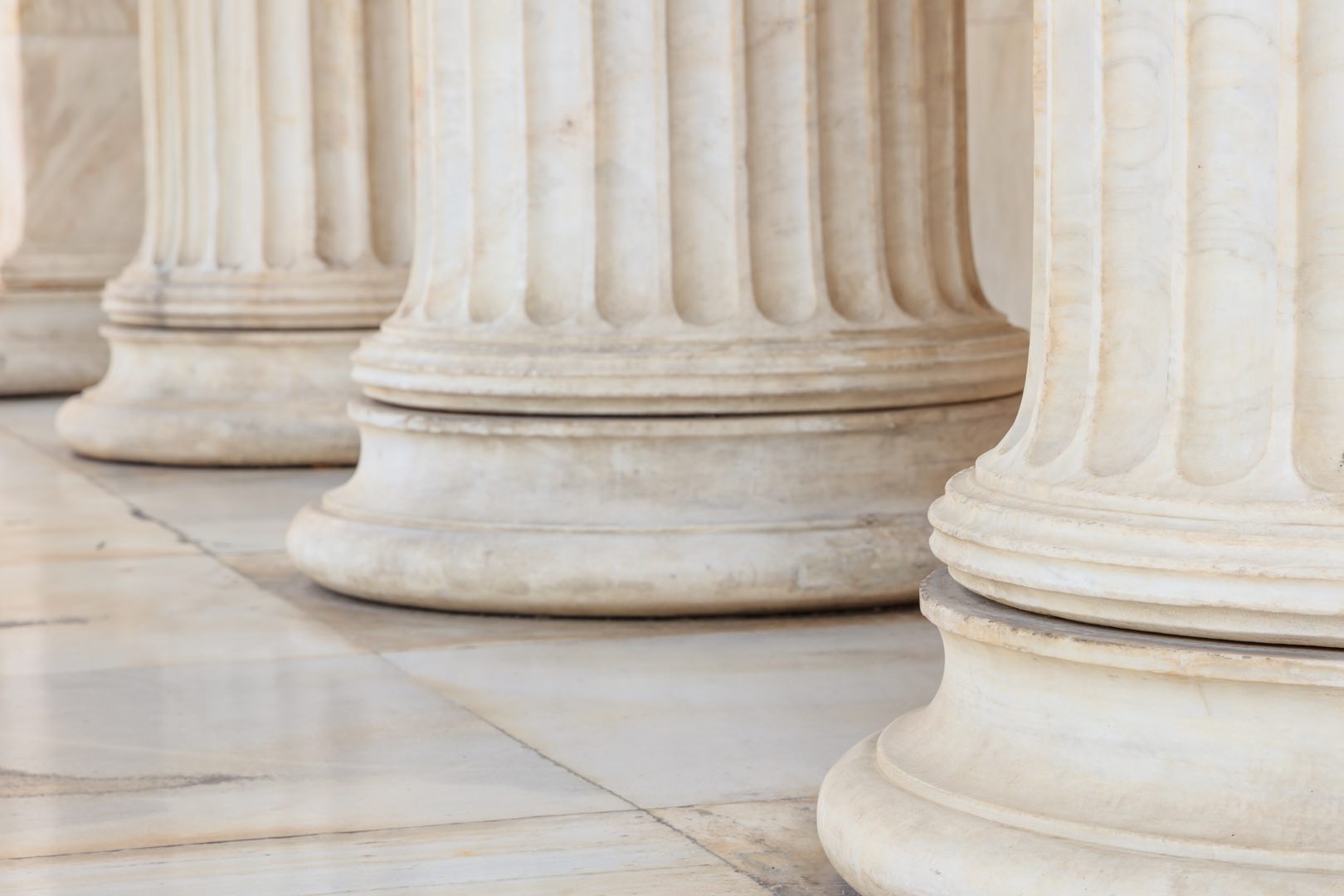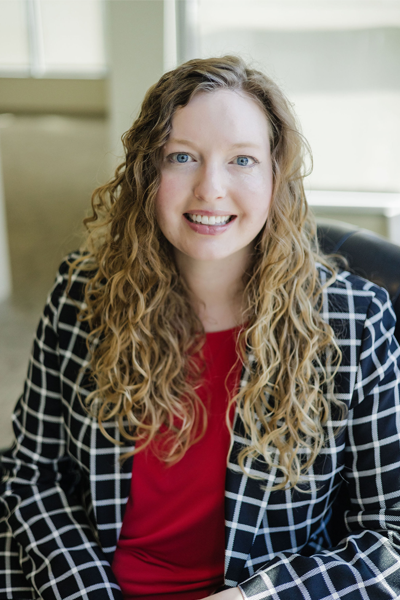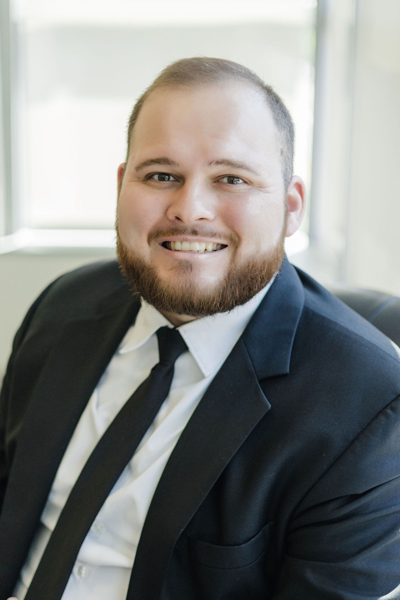Advocacy
Our Role in Advocacy
As the leading national voice for Christian higher education, the CCCU aims to be an effective, respected, and honest advocate for Christ-centered higher education both in the United States and around the world. The CCCU’s advocacy is primarily centered in the United States, although we represent our international institutions to the U.S. governmental agencies as the need arises. In all circumstances, the CCCU advocates for the universal educational principles of accessibility, affordability, and accountability that are shared by both U.S. and international institutions. The CCCU is a non-partisan organization striving to work effectively with all political parties to advance the cause of Christ-centered education.
The CCCU believes that Christian higher education contributes in wonderful and unique ways to the good of the world and the United States. Primarily it is in our graduates, the programs on our campuses, and the writing and research that flow from the extraordinary faculty that makes the world a better place. CCCU institutions practice a coherent approach to education in which they seamlessly weave together the development of the mind, spirit, body, and emotions in the quest not just for knowledge, but also for wisdom and faithfulness. CCCU institutions train future leaders who are deep thinkers and equipped doers, committed to working for the common good of their communities because of their faith in Jesus Christ.
The CCCU provides a unified voice to highlight the contributions of our institutions for the common good. We also advocate for the right of each of our institutions to practice their sincerely held religious beliefs. We uniquely position ourselves to speak to national leadership in the halls of Congress, the administration, and the courts on behalf of every individual Christian college and university that is part of our association.
For a summary of the CCCU’s advocacy each year, click here to review the annual report.
Economic Impact
One way a nation flourishes is through a robust and healthy economy. CCCU institutions contribute significantly to the economic wellbeing of the United States.
The Case for Christian Higher Ed Full Economic Impact Report
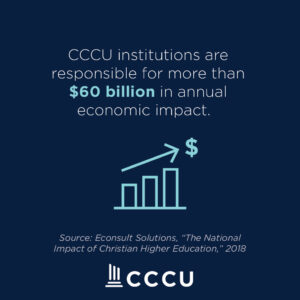
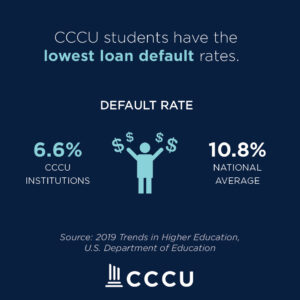
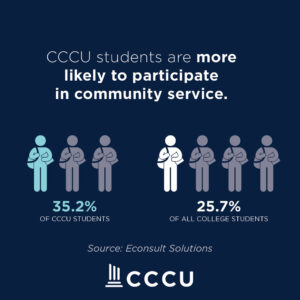
Religious Freedom and Institutional Autonomy
The ability of CCCU institutions to educate according to their religious mission is crucial. All institutions in the U.S. must be accredited by an accrediting body to receive federal aid. In November 2019, the Department of Education issued final regulation 34 C.F.R. §§ 600, which, among other things, created a definition of religious mission and precludes accreditors from using as a negative factor in their accreditation decisions the religious-mission-based policies, decisions, and practices of an institution. Religious mission is defined as “a published institutional mission that is approved by the governing body of an institution of postsecondary education and that includes, refers to, or is predicated upon religious tenets, beliefs, or teachings.” The CCCU continues to advocate that Congress codify the updated regulations in the next Higher Education Act.
CCCU institutions stand united in their support of institutional autonomy and the principles of religious and associational rights that undergird it. This autonomy of mission is essential for each institution to be able to contribute to the larger higher education landscape in its unique way and thus comprises a foundational value of the CCCU. Since its founding, the CCCU has been a leader in advocating in the courts, to Congress, and within presidential administrations for the freedom of its institutions to exercise their First Amendment rights. These rights of religion, association, and speech ensure CCCU institutions can teach as well as maintain policies that are consistent with their religious beliefs and convictions while participating fully within the public square.
To view the CCCU’s Religious Freedom Toolkit, click here.
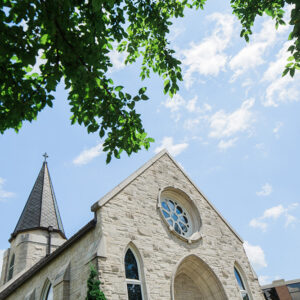


The Courts
The CCCU is involved almost every year in cases before the Supreme Court of the United States. The Court’s rulings will impact Christian higher education’s ability to carry out its mission. The CCCU leads or joins amicus briefs as we see necessary to advance the long-term wellbeing of Christian higher education. We think the decisions made in the courts hold great power over the direction of the legislature. It is important to continue advocacy at all levels of the federal government to ensure that Christian colleges and universities are able to operate and serve their students well while aligning with their missions.
The CCCU filed an amicus brief in the case of Fulton v. the City of Philadelphia. This case involves Catholic Social Services, a faith-based agency that has been serving vulnerable kids for 200 years. The city of Philadelphia stopped placing kids with foster parents that partner with Catholic Social Services, demanding that the agency change its religious practices or close. We asked the Court to protect the freedom of faith-affirming foster agencies nationwide to maintain their deeply held beliefs while serving those most in need. The Supreme Court decided the case in June 2021 in a 9-0 ruling that Philadelphia’s refusal to place foster children through Catholic Social Services violated the Free Exercise Clause. The Supreme Court’s ruling was based on the fact that the City of Philadelphia’s agreement included a clause for exemption, even though an exemption had never been granted. The Supreme Court in its ruling stated, “Catholic Social Services seeks only an accommodation that will allow it to continue serving the children of Philadelphia in a manner consistent with its religious beliefs; it does not seek to impose those beliefs on anyone else.[1]”
[1] Fulton v. the city of Philadelphia, Becket Religious Liberty for All (Supreme Court of the United States n.d.). Retrieved March 15, 2022, from https://becketnewsite.s3.amazonaws.com/Fulton-SCOTUS.pdf.
In December of 2021, the Ninth Circuit issued its opinion in Maxon v. Fuller Seminary. The lawsuit against Fuller Seminary alleges that the seminary violated anti-discrimination laws. Two critical issues in this case were: 1. The constitutionality of the religious schools’ exemption to the Title IX requirements regarding sexuality and gender, and 2. The determination of whether and how a school not controlled by a denomination, but organized as an independent religious school, can qualify for the exemption. In its opinion, the panel rejected Maxon’s challenge saying, “the language of Title IX does not condition an institution’s ability to claim the religious exemption on filing written notice or on any other process—the exemption is mandatory and automatic.”
The panel also rejected Maxon’s argument that the Title IX religious exemption does not apply to institutions like Fuller that lack an external control organization and is instead governed by a religious board of directors. The panel agreed that it would be inappropriate to second-guess the religious beliefs of Fuller to determine whether there was a conflict between Title IX and Fuller’s religious beliefs and held that Fuller’s actions fell squarely within Title IX’s religious exemption. The CCCU filed a brief in this case, and we are pleased with the outcome of this case and grateful for a decision that reinforces the strong protection of the Title IX religious exemption.
The CCCU joined a brief filed in the Supreme Court by the Christian Legal Society in the case Carson v. Makin that argues the unconstitutionality of excluding religious schools from a benefit available to other private schools. The state of Maine provides funding to students in rural parts of the state to attend a private school as long as that school is not sectarian. This brief argues that this is a direct violation of the First Amendment as the State is singling out religious schools for discrimination. The Court heard oral argument on December 8, 2021.
The federal lawsuit filed against the Department of Education names 40 plaintiffs from 29 institutions, 21 of which are CCCU schools. This class-action lawsuit seeks to strip longstanding religious protections from Title IX, a law that has promoted diversity in higher education for nearly 50 years, and eliminate federal funding from going to students who choose to attend a religious college or university. Attorney Gene Schaerr at Schaerr | Jaffe was hired as legal counsel for the CCCU, which was granted “intervenor” status in the fall of 2021.
This lawsuit aims to take federal financial aid away from hundreds of thousands of students who choose to attend faith-based colleges and universities. This would restrict student choice in an unprecedented way, preventing middle- and low-income students from being able to take their federal aid to these institutions. Faith-based higher education has always been an essential element of the diversity of higher education in the United States—many of the first colleges and universities in the country were religious—and it is crucial that students continue to be given the opportunity to choose and access the college of their choice in a diverse educational landscape.
Given the status of the law, the plaintiff’s case should be dismissed. But cases have expected and unexpected outcomes. Regardless of the outcome, the CCCU takes reports of student experience seriously. Christian higher education is committed to learning, growing, and deepening our understanding of how we can provide and strengthen support for all students on Christian college and university campuses, as CCCU institutions should be places where all students feel safe, supported, and welcome. CCCU institutions subscribe to sincerely held biblical beliefs, which include specific religious convictions around human sexuality and gender, and are transparent about their policies and behavior guidelines, which students voluntarily agree to when they choose to attend the institution. Campuses work hard to ensure that potential students understand their institution and its religious identity and want to be a part of that community.
On July 16, 2024, oral arguments in the Hunter v. U.S. Department of Education were held in the Ninth District Court of Appeals in San Francisco. The three-judge panel asked several different questions but really focused on the fact that the District Court judge ruled on the plaintiff’s Establishment Clause claims using the Lemon test. Given the 2022 Supreme Court decision in Kennedy, the Lemon test was no longer the prevailing case law when the Hunter case was decided in 2023 and the plaintiff’s arguments should have been updated to reflect that. Based on the hearing, the primary paths forward include remanding the case back to the District Court to use the Kennedy test or the Ninth Circuit could rule using Kennedy without remand because it is an issue of law, not fact. We are confident that the weight of historical practices and tradition is on our side and would appreciate your continued prayers as the judges determine the future of this important case.
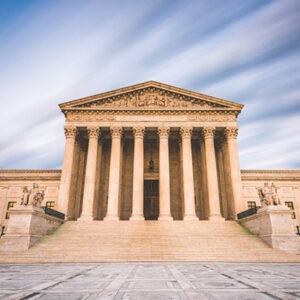
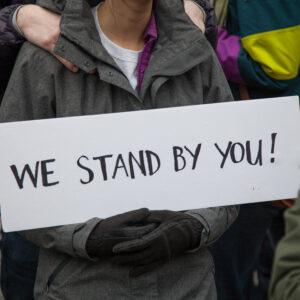
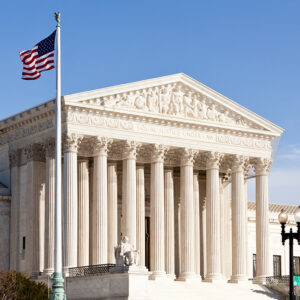
Congress
In the last two decades, there has been a general cultural shift from the religious affirmations of generations ago to an increasing secular preference both for individuals and for civic expression in government. There have been numerous Supreme Court cases asking for clarification on the free exercise of the First Amendment to the U.S. Constitution. The Supreme Court speaks most consistently for religious expression when there is also underlying legislation. It is undisputed that there are and will be increasing clashes between progressive and conservative ideologies regarding the value of religious expression in the public square and the value of religious civic society. Consider the Supreme Court’s record under both Chief Justices Rehnquist and Roberts: for all cases that involved only First Amendment claims and not an accompanying statute, the Court has protected religious freedom only about 50 percent of the time—and that’s going all the way back to 1987. However, when there is an accompanying statute, the Court has protected religious freedom a little over 90% of the time, highlighting the importance of accompanying statutes. Download “The Supreme Court’s Religious Liberty Cases: Constitutional v. Statutory Claims.”
The United States practices what has been called “civic pluralism.” Civic pluralism is at its best when both majority and minority voices in the public square are protected. The minority voice can be the voice of faith or no faith at all. CCCU institutions are often seen as countercultural in their beliefs and represent values in line with Christian commitments. However, we also recognize that the world is not the Church, but instead a place of many viewpoints and that ultimately each person is accountable for their own actions before God. The sacred space of the church is distinct from the public space of the world.
Numerous pieces of legislation are introduced in Congress that impact religious organizations. One piece of legislation, the Equality Act, was passed in 2019 by the House of Representatives. If the Equality Act were signed into law as written in the 2019 bill, Christian higher education would be negatively impacted in these specific areas (though this is not an exhaustive list):
- Hiring according to religion, including religious standards of conduct, will be threatened by this Act. While there is a current religious protection in Title VII, courts may interpret it so narrowly that a school could make hiring decisions based only on whether the applicant professed to be a member of the same religion, regardless of whether the member actually followed the institution’s religious beliefs and teachings.
- Federal financial aid (such as Pell grants) will be jeopardized for any student seeking to attend a religious college or university whose religious teachings vary from the Equality Act. This penalty on middle- and low-income students would disproportionately impact religious students, first-generation college students, and students from racial and ethnic minority groups.
- Properties of religious schools will be treated as public accommodations (spaces). This would require the religious college to allow access to campus facilities to the general public, even to those who don’t comply with university religious standards. Additionally, the bill makes a place of “gathering” a public accommodation, which raises doubts about whether a house of worship or the sacred spaces on a college campus would now be governed by federal law.
- Federal research grants will be denied to any religious university that enforces religious conduct standards in its student admissions, continuing enrollment, and graduation decisions, even when they are the best qualified or most cost-effective institutions to conduct the research. Taxpayers lose when government must select from a smaller pool of applicants.
- The bill has no protection from the loss of federal or state tax-exempt status because of a religious organization’s lawful expressions or activities stemming from its beliefs regarding marriage, human sexuality, and gender. Loss of tax-exempt status would harm students directly, as scholarships, new classrooms, and athletic facilities are all funded through the generous donations of others.
- The bill guts the Religious Freedom Restoration Act (RFRA), whose important balancing test ensures that the government is rightly protecting the religious rights of its citizens. Without this balancing test in place, LGBT rights will always trump an institution’s religious conscience rights, no matter how great the harm to religion.
We believe there is a better way. In the CCCU’s advocacy role, we employ a legislative strategy to address legislation that impacts Christian colleges and universities in a way that complements our court and executive branch strategies. One such strategic deployment was supporting the introduction by Representative Chris Stewart (R-UT-2) on December 6, 2019, of a bill called the Fairness for All Act (H.R.5331). Instead of the Equality Act, this bill is a comprehensive religious freedom bill that also recognizes the desire by LGBT Americans for civil rights protections. When non-religious people support the rights of the religious, we do not assume they are endorsing a particular religion; instead, they are endorsing the Constitution. Likewise, the endorsement of civil rights for all Americans does not imply endorsement for how individuals use the rights granted. Rather, Fairness for All reflects the belief that in a pluralistic society, people with different beliefs need to find a way to live together and that rights for one group should not result in an existential threat to the other.
On June 15, 2020, the Supreme Court’s 6-3 decision in Bostock v. Clayton County, concluded that discrimination because of sexual orientation or gender identity is necessarily discrimination on the basis of sex, thereby amending Title VII. This ruling established a substantial goal of the Equality Act by enacting by court ruling the concept of LGBT civil rights and civil rights in employment in particular. The Court’s ruling also addressed a goal of the Fairness for All Act by highlighting the importance of religious freedom protections, noting the Court is “deeply concerned with preserving the promise of the free exercise of religion enshrined in our Constitution; that guarantee lies at the heart of our pluralistic society.” The decision acknowledged religious freedom protections like Title VII “express statutory exception for religious organizations,” the ministerial exception, and the Religious Freedom Restoration Act, but it did not discuss their application to the cases in Bostock. The Supreme Court’s decision recognized that there are many questions to be resolved, leaving great uncertainty. The legislative strategies of the CCCU continue to take into account the status of ongoing introduced legislation in both houses of Congress.
Select Media Coverage
Time Magazine: The Supreme Court Tries to Settle the Religious Liberty Culture War
Faith Angle Forum: Shirley Hoogstra & Tyler Deaton Discuss Fairness for All
Associated Press: GOP Rep. Pitches LGBTQ Rights Bill with Religious Exemptions
Christianity Today: LGBT Rights-Religious Liberty Bill Proposed in Congress
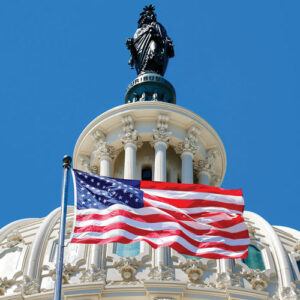
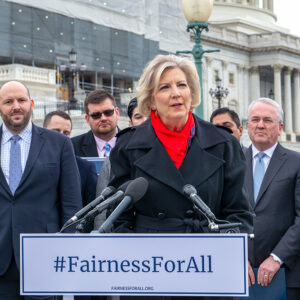
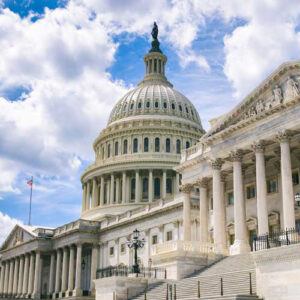
Financial Aid
Christian colleges serve a high percentage of first-generation and lower-income students. A National Economic Impact Report of CCCU institutions found that one in three CCCU students are first generation college students, and 50% of CCCU students come from families that make less than $50,000 per year. As such, students attending our schools and their families depend upon financial aid both from our institutions and from federal and state governments. We work to ensure state and federal financial aid remains accessible to students for any kind of institution they want to attend. We seek to ensure that students from all socioeconomic backgrounds are able to attend a Christian college or university so that high-quality, Christ-centered education is available to all students — not just those who are part of a higher income bracket.
The CCCU supports and advocates for increases to the amount allocated for the Pell Grant Program. One in three CCCU students receive a Pell Grant, and these grants are vital to ensure low-income students have access to high quality education. 38.7 percent of CCCU undergrads are Pell recipients, a larger percentage than any comparison group. At the same time, our students’ 6.6% loan default and 77.6% five-year repayment rates are the best in higher education. CCCU institutions also have more “skin in the game,” allocating about $11,900 per student in institutional aid. College cost concerns have generated reform ideas such as completely tax-funded tuition, making colleges increase their “skin in the game” and consolidating aid into a one grant/one loan framework. The CCCU supports expanding Pell to year-round use, expanding the Second Chance Pell pilot program for incarcerated Americans, streamlining student aid, and smart simplification efforts that maintain institutional flexibility to serve the neediest students.
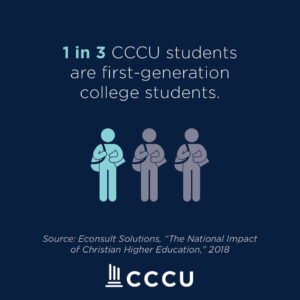
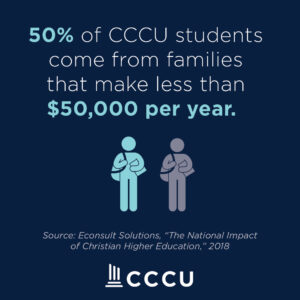
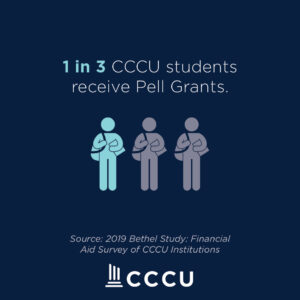
Tax Policy
The CCCU understands the effect of tax reforms on Christian colleges and universities. We strive to ensure that policymakers consider nonprofits when creating reforms and to ensure that nonprofits are not equated to for-profits when it comes to different taxes. Nonprofits are inherently different; they do not seek a profit and should be treated accordingly. We also understand and advocate for incentivizing giving, especially for younger, beginner donors. Encouraging giving at a young age increases the likelihood that someone will continue to contribute to society as they get older.
The CCCU supports charitable giving at all levels for all individuals. Overall levels of giving have been decreasing according to the Giving USA Foundation, and a universal charitable deduction could help reverse this trend. Many private colleges and universities rely on charitable donations to provide aid to students and create sustainable programs for the future. Congress should incentivize giving from all people, not just those in a high-income bracket. The charitable deduction is a vital and unique incentive that encourages a selfless act. For every $1 subject to the charitable deduction, communities receive $3 in benefits (for more information: Charitable Giving Coalition). It is unlikely governments could find a better way to leverage private investment in community services. Indiana University’s Lilly Family School of Philanthropy has found that the percentage of Americans who give has fallen by 11% over the past 14 years—from 67% in 2002 to just 56% in 2014. The doubling of the standard deduction in the Tax Cuts and Jobs Act of 2017 accelerated this trend. We advocate for charitable giving incentives that encourage all donors to give generously to support the work of Christian higher education as well as other charitable organizations.
For the first time in over a century, the government started taxing nonprofit colleges, with little public awareness. The tax represents an overreach of the government: a source of revenue for the government to offset other tax cuts, rather than focus on helping college students. A study by the Education Trust estimates that 40% of restricted endowment funds are spent on student financial aid. Taking money away from the institution hurts students, and this tax should be repealed.
The 2017 Tax Cut & Jobs Act imposed new taxes on tax-exempt organizations by expanding the rules for Unrelated Business Income Taxation (UBIT). The CCCU worked hard alongside other organizations to get one of the provisions repealed nicknamed the “parking lot” tax, the provision imposed a 21% UBIT on the expenses that nonprofits incur for providing their employees with transportation benefits. But there is still more work to be done. Another provision in the act requires nonprofits to break down their revenues and expenses for every trade or business separately, preventing different areas of a nonprofit from balancing out losses/gains in another area. It is important to note that for-profit businesses are not required to do this “silo-ing”. The CCCU believes that, like the “parking lot” tax, this provision also needs to be repealed.
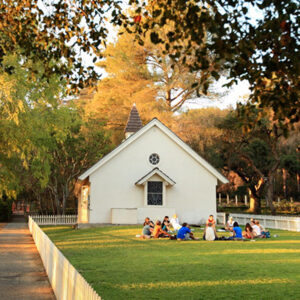

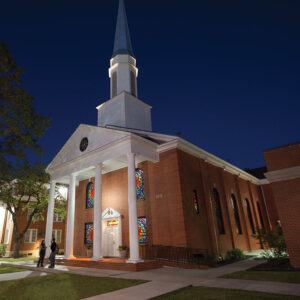
Department of Education & Other Regulatory Agencies
When it’s done well, federal regulation of higher education provides standards of excellence and promotes the collection and sharing of valuable and valid information about the performance of higher education in general and of specific institutions. However, federal regulation often becomes burdensome and overly detailed, and it can—intentionally or unintentionally—discriminate against certain types of educational institutions, including religious institutions. We support reasonable and cost-effective regulatory guidance and requirements that do not discriminate against Christian higher education, and we work closely with both Congress and the U.S. Department of Education on these issues.
The Department of Education requested comments on Section 117:
Section 117 of the Higher Education Act of 1965 (HEA), as amended, requires certain institutions that participate in the Title IV student assistance programs to submit to the Secretary disclosure reports containing information about gifts received from any foreign source, contracts with a foreign entity, and any ownership interests in or control over the institution by a foreign entity.
We submitted comments on these regulations focusing on the prohibition of anonymous donors and suggesting other ways to ensure compliance without risking the identities of donors who might fear religious persecution in their country. It is important that the institutions be able to maintain the privacy of their donors. We believe the Department should not require institutions to divulge the identity of donors that request anonymity. If the Department does require that information, we believe our donors must be able to trust our government to maintain confidentiality; we do not want anyone persecuted for supporting a religious organization.
On May 6, 2020, the Department of Education issued final regulations under Title IX of the Education Amendments of 1972, which prohibits discrimination on the basis of sex in education programs or activities receiving federal financial assistance. Click here for a Department of Education summary of the regulations.
On September 23, 2020, the Department of Education published the long awaited “controlled by” language for religious institutions in the Improving Inquiry, Transparency, and Accountability at Colleges and Universities final rule.
Some background: Federal law provides that Title IX “shall not apply” to educational institutions that are “controlled by a religious organization,” to the extent that application of Title IX “would not be consistent with the religious tenets of such organization.” Some CCCU institutions have chosen to request the assurance of a religious exemption letter from the Department of Education and some have not. Those that choose to pursue the assurance letter have to be “controlled by a religious organization.” But the phrase “controlled by” has not been defined, which has led some institutions not governed by a denomination to experience a delay in receiving their Title IX exemption letter.
The new regulations include a list of non-exhaustive factors that help determine if an institution is controlled by a religious organization. Any of these are deemed “sufficient to establish that an educational institution is controlled by a religious organization … and is therefore eligible to assert a religious exemption”:
- The institution is a school or department of divinity.
- The institution requires faculty, students, or employees to be members of, engage in religious practices of, or espouse a personal belief in the religious organization by which it claims to be controlled.
- The institution’s charter, catalog, or other official publication contains an explicit statement that it is controlled by a religious organization or is committed to the doctrines or practices of a particular religion; the members of its governing body are appointed by the controlling religious organization; and it receives a significant amount of financial support from the controlling religious organization.
- The institution has a doctrinal statement or a statement of religious practices, along with a statement that members of the community must engage or espouse belief in the religious practices or doctrinal statement.
- The institution has a published institutional mission that is approved by the governing body of an educational institution and that includes, refers to, or is predicated upon religious tenets, beliefs, or teachings.
The final regulations also address three additional areas of importance:
- Promotes free speech at colleges and universities – This rule codifies President Trump’s executive order on free speech in March. For private colleges and universities, the rule will hold them accountable to their own policies on free speech. If a court determines the school violated its own policy, the regulations state that the Department of Education may engage in suspension or termination of federal awards or debarment.
- Ensures equal treatment of religious student groups – This rule is specifically for public colleges and universities and holds them accountable to give all rights and benefits to all student groups, including religious ones, regardless of beliefs, practices, speech, and membership and leadership standards.
- Revises regulations governing some discretionary grant programs under Titles III and V – Current regulations could prohibit a school from using such a grant for even secular activities or services such as teaching a course about world religions. The rule more narrowly tailors the prohibition on the use of these grants to religious instruction, religious worship, or proselytization. The rule also more narrowly defines a “school or department of divinity” to clarify that institutions are not prohibited from using grants for a secular department of religion.
A fact sheet on the final rule is available here, and guidance for the final rule is available here.
Prison Education
The CCCU supports our institutions in their work to provide second chances and to advocate for restoration of Pell eligibility. Twenty-one CCCU institutions currently operate programs for the incarcerated. Research from the RAND Corporation shows education programs reduce recidivism; inmates participating in educational programs are 43% less likely to recidivate. RAND Corporation also discovered that a $1 investment in prison education reduces incarceration costs by $4 to $5 during the first three years post-release. The CCCU seeks the expansion of educational opportunity for all people, including incarcerated individuals.
Baylor University, Texas
Baylor University is partnered with Prison Entrepreneurship Program (PEP), where three of the eight board members are Baylor alumni. Since its inception, 3,300 inmates have graduated from the program.
Over the last 17 years, Baylor University and PEP have collaborated to provide education and opportunities for incarcerated individuals. The Baylor Institute for Studies of Religion has studied the program’s effectiveness, and Baylor MBA students working closely with PEP participants since 2007, reviewing their business plans and providing guidance, research, editing and marketing information.
In addition, PEP works closely with the Baylor Collaborative on Hunger and Poverty to enrich underserved and underrepresented communities. PEP delivers results at the intersection of restorative justice reform and economic mobility through intensive character development, an entrepreneurial boot camp and specialized mentorship that, when combined, produce successful business owners, exemplary employees and good neighbors. Overall, the collaboration between PEP and Baylor University has been a powerful force for social change, providing education and opportunities for incarcerated individuals and helping to reduce recidivism rates in Texas.
Bethel University, Minnesota
Bethel University partners with the Prison Fellowship Academy (PFA) to enroll incarcerated individuals as degree-seeking students who earn 12 credits with the university upon completion of the PFA curriculum. Similarly, Bethel has an ongoing partnership with FreedomWorks, which exists primarily to help recently released individuals reconcile with God, family and community. FreedomWorks provides residents lodging, treatment and programming options, and offers continuing educational opportunities through courses in the College of Adult & Professional Studies.
Calvin University, Michigan
Calvin Theological Seminary (CTS) began offering unaccredited courses for inmates at Michigan’s Handlon Correctional Facility in 2010. Inspired by the students’ desire to learn, CTS partnered with Calvin University and, in 2015, launched a fully accredited five-year program for inmates to earn a bachelor’s degree with double majors in faith and community leadership and human services. In the 2023-24 academic year, CPI added a second course of study for all CPI students. The human services major meets the needs of students in the prison context who desire to serve individuals and groups, preparing them for human service occupations or master’s degrees in related fields, such as counseling, education and social work.
The Calvin Prison Initiative (CPI) accepts a cohort of 25 students each year and offers degrees to inmates serving long or life sentences. While many prison education programs focus on employment readiness for soon-to-be-released inmates, CPI seeks to transform prison culture from within by equipping graduates to be servant leaders in the prison community. By affirming the inherent dignity of all inmates, even those who will not re-enter the larger society, CPI brings hope and a sense of vocation to those who will have the greatest impact within prison walls. Students and graduates who are released from prison are prepared to serve their communities in meaningful and positive ways. To date, CPI has granted 62 bachelor’s degrees, 96 associate degrees, and 158 certificates. The student retention rate at CPI exceeds that of the main campus, with inmates reporting at 94% and traditional undergraduates at 89%.
The Calvin Prison Initiative recently launched social media platforms (Facebook, Instagram, and LinkedIn).
Calvin will also host a conference on higher education in prison in October 2024. Representatives from 15 CCCU schools across the country attended Calvin’s first Higher Education in Prison Conference in May 2023. The 2024 conference on developing learning communities within the prison context.
One student of the program said, “I have to admit I am a much happier person because of this program. I never thought that I would enjoy being in school, but at the risk of sounding childish, I am having fun learning new ideas, theories and how some of the greatest thinkers the world has known operated.”
To learn more about CPI, visit https://calvin.edu/prison-initiative/.
Campbell University, North Carolina
The Campbell University Second Chance Initiative, which started operation in 2019, offers programming for justice-impacted learners inside men and women’s prisons and, in collaboration with Arise Collective, outside of prison with recently released women. Incarcerated students complete a two-year, 23-course associate degree in behavioral science, and after graduation, continue on to pursue a bachelor’s in communication with a minor in addiction studies. Recently released women obtain an associate degree in general education or behavioral science, and then continue on with their choice of bachelor’s degree.
In addition to their four-years coursework, students receive training and a certificate to be a peer support specialist, allowing them to support their peers with various issues experienced by justice-impacted people. A point of pride for students at Sampson Correctional is their student advisory council, which allows them to come together, provide feedback on the program and take an active role in developing their own education. Due to this council’s success with students, Anson Correctional students will start their own student advisory council during the Spring 2024 semester. Students can also participate in numerous extracurricular activities, including the Wiggins Library Symposium; writing for the Second Chance Initiative newsletter, Trailblazers, which is published three times a year; workshops on topics such as poetry and creative writing and more.
Second Chance Initiative students are extremely successful in their studies, with multiple students earning Dean’s List (3.5-3.9 GPA) and President’s List (4.0 GPA) every semester. In addition, six students have been inducted into Alpha Sigma Lambda, the nation’s oldest adult learning honor society. To obtain this honor, students had to complete 24 credit hours at Campbell, earn at least a 3.5 overall GPA and be in the top 20% of adult and online education students.
In August 2023, the Second Chance Initiative celebrated the graduation of our first cohort to complete their bachelor’s degree at Sampson Correctional Institution. Eight students received their bachelor’s degrees from Campbell University, and our second cohort of nine students received their associate degree. This is a momentous achievement for the students and the program, and the November graduation was attended by numerous important stakeholders, including the governor’s chief of staff, Kristi Jones, and North Carolina Department of Adult Corrections Secretary Todd Ishee.
Crown College, Minnesota
In 2020, Steven Scott, a former prisoner, felt called to bring Christ into the prisons and teamed up with Crown College to create Hope to the Hopeless (H2H). This program offers a two-year associate degree in Christian ministry within Tecumseh State Correctional Institution in Nebraska with the goal of educating and equipping incarcerated individuals with the knowledge and power of Christ. Hope to the Hopeless enrolled an initial cohort of 13 students who began coursework in March.
This program is donor-funded. Thus far, H2H has successfully raised over $200,000 with support from the surrounding community. Their goal is to fundraise tuition and fees for the students as well as the necessary learning materials required for each course (e.g., textbooks, notepads, writing materials, etc.).
One prospective student stated, “I want to commit my life to do the work of the Lord and help people find salvation in Him. Even though we are sinners, He still loves us and wants us to seek Him for forgiveness and help. I want to be part of this to learn how to spread the Word and to help people come to know our Lord and Savior. Thank you for this opportunity.”
Hannibal-LaGrange University, Missouri
In partnership with the Missouri Department of Corrections and the Global Prison Seminaries Foundation, Hannibal-LaGrange University provides theological education for long-term prisoners by offering an undergraduate Christian studies degree program within the maximum-security Jefferson City Correctional Center. The program began July 1, 2020, and is titled Freedom on the Inside. Its vision is to equip and send offenders out to work as field ministers in prisons across the state by teaching them to think biblically and deeply, to act justly and to live as Christ’s representatives in the prison system and the world.
Indiana Wesleyan University, Indiana
Indiana Wesleyan University began offering courses at Plainfield Correctional Facility in June 2023 with two active cohorts. To date, five students have completed the program, and another seven will complete the program on April 8, 2024. A graduation experience is scheduled for May 17, 2024. The president of the university will be in attendance. These courses are offered under the Pell Experimental Sites Initiative (ESI) program. IWU plans to begin two new cohorts in April and June 2024 with 19 students. They are also exploring ways to expand this program to other facilities in Indiana.
Lipscomb University, Tennessee
The Lipscomb Initiative for Education (LIFE) began in 2007, with 15 inside and 15 outside students meeting together at the women’s prison. Today, more than 40 inside students are enrolled at the Debra K. Johnson Rehabilitation Center (for women), and 10 are enrolled at the Riverbend Maximum Security Institution (for men). In 2018 Lipscomb started the nation’s first seminary in a women’s prison. Through the LIFE program, 22 students have earned an associate of arts degree, 13 have earned a bachelor’s of professional studies and eight have earned a Master of Arts in Christian ministry. Additionally, Lipscomb supports students post-release with the Richard C. Goode scholarship, named for the program’s founder. This scholarship has supported more than 10 students continuing their studies on campus or online. This scholarship allowed Sarah Bryant Bailey, who began her education with Lipscomb with the first cohort in 2007, to return to Lipscomb and complete a bachelor’s degree in 2023. Sarah said, “Education is about giving myself the best options to choose from and writing my own story. I get to change the narrative and be who God created me to be.”
Moody Bible Institute, Illinois
The Moody Bible Institute has demonstrated a unique way to work in prison ministry. Moody developed a custom devotional on the gospel, Today in the Word, and printed 115,000 copies for distribution by Prison Fellowship. Following the great success of this initial partnership, the devotionals were also translated into Spanish.
Today in the Word also partners with Set Free to send the devotional to 4,500 inmates each month. Moody has enjoyed a long-standing relationship with Set Free Ministries in Riverside, California, an organization led by Phil Wagner. Set Free cares for the logistics of getting Bible materials through prison regulations to successfully connect with inmates. According to Phil, this past year the ministry had 820 new enrollments and 1,677 professions of faith.
Oklahoma Baptist University, Oklahoma
Oklahoma Baptist University offers a four-year, 120 credit hour Bachelor of Arts degree in Christian studies at the Lexington Correctional Center in Lexington, Oklahoma. Each course is taught face-to-face at the prison by OBU professors and adjunct instructors. Students also complete two semester-long internships as part of their graduation requirements. The facility chaplain serves as the field supervisor for the internships.
Their goal is to impact the lives of students and those within their circles of influence through OBU’s traditional transformational education. The ultimate objective is to change the prison culture in the state of Oklahoma. To that end, the Oklahoma Department of Corrections will consider graduates as field ministers and transfer them in teams of two to four to prisons throughout the state. These men will doubtless influence their specific communities through their character, conduct and learned skills. Their first cohort of 35 students completed their sophomore year in May 2023. Twenty of these students made the President’s List in the fall semester. The second cohort of 34 students began their studies in the Fall 2023 term.
Here are what several students have said about the program:
“The Christian Worldview course allowed me to see Jesus interact with humanity. It taught me that the way we engage the world is related to the way we view the world. This newfound compassion allowed me to see others in need physically, spiritually and emotionally and be compelled to act on their need. No longer was I afraid to approach someone and try to lend a helping hand anyway I could. I am no longer just present in the community but available to the community.” —J.S
“This Christian liberal arts education helped me mature into a responsible man, but it also held pragmatic value as our intern team interacted with the community with care, compassion and love rather than indifference, division and hate. In less than one year, our team led over 300 men in the maximum yard to know Jesus. Those men decided it was time to live life differently. Now, imagine what could happen if every prison facility in America had Christian liberal arts education program similar to the Prison Divinity Program.” —E.C
Oklahoma Christian University, Oklahoma
Oklahoma Christian University’s prison ministry program offers courses that will lead to an associate degree in business at Mabel Bassett Corrections Center. Currently, 18 women are in the program and most of them have completed nearly 24 hours of coursework towards the 60-hour degree in areas such as speech communication, Bible, English composition and math. The work at Mabel Bassett Corrections Center is completely missional to the work of Oklahoma Christian University. Christian faculty teach all OC classes from a Christian worldview. Evidence from the first cohort shows that, without exception, the MBCC students welcomed and preferred discussions of faith when appropriate during class and pursued faith-based options when given a choice in assignments. An art show of scripture art that the women created in their Gospel of Matthew class was given a full gallery exhibition in the spring of 2023.
Prairie College, Alberta, Canada
The Prison Bible Encounter Program, started in September 2016, is a first-year college certificate program offered by Prairie College in various Canadian federal correction facilities in Western Canada. Students who successfully complete the program earn a certificate in Bible. While the program in its entirety consists of 10 courses, potential students are encouraged to enroll even if they cannot complete the entire certificate program, which takes upwards of three years. Students receive credit for each completed course, and each course offers tremendous value and merit for personal development, even as standalone courses.
Each course requires no less than 30 instructional hours. In addition, students are required to invest at least 70 hours in study/homework. In a typical class schedule, each course includes one 2.5-hour class each week. A course is thus completed in 12-15 weeks. The 10 courses of the certificate program are offered in a consecutive (back-to-back) model.
Prairie College provides the program at no direct cost to the institution or the student. Inmate students are enrolled on a scholarship basis. Program costs are underwritten through the generous donations of Prairie supporters. Prairie College receives no public or government funding for this program. Currently, Prairie is delivering seven classes in six federal institutions in Western Canada, with approximately 60 inmate students enrolled. They are also pursuing requests from two additional institutions in Canada with the possibility of national expansion in the years to come.
Samford University, Alabama
The Ministry Training Institute of Samford University (Samford Extension Division) currently offers four non-credit diplomas to inmates at Aliceville Federal Correctional Institution, South Central Correctional Facility and Bibb Correctional Facility. Each academic year Samford offers at least four academic terms that include courses such as Hermeneutics, Systematic Theology, Spiritual Disciplines, Paul’s Letters and Introduction to the Old and New Testaments.
Samford has offered classes at the Aliceville Federal Correctional Institution (a women’s federal institution in Pickens County, Alabama) since 2014 with hundreds of inmates taking classes and dozens receiving diplomas over the past decade. Samford began offering classes at the South Central Correctional Center (a state facility in Wayne County, Tennessee) in the fall of 2022. Since its inception, the program has averaged 16 students per term. The new location at the Bibb County Correctional Facility (a state facility in Bibb County, Alabama) began as a partnership between Samford and the Bibb Baptist Association in the summer of 2023. With support from Bibb County Baptists, this new endeavor has enjoyed remarkable success with an average class size of 25 students. The Spanish educational track, which launched in Aliceville in the fall of 2018, continues to enjoy great success with enrollments increasing in the Hispanic population of the prison each year. Over 60% of the inmates at this facility are Hispanic and more than 250 have participated in classes since the inception of this program.
Trinity International University, Wisconsin
Trinity International University partnered with the Wisconsin Inmate Education Association (WIEA) to establish an extension site inside Waupun Correctional Institution. TIU offers a full-time, cohort-based, four-year Bachelor of Arts program in biblical studies to inmates serving sentences ranging from many years to life.
TIU’s third cohort will graduate on June 13, 2024, bringing their total number of graduates to 40. There are currently 24 men in the program, and they are looking at adding a new cohort this coming fall, raising the number to 35. The current graduation rate is 70%, with the interest/enrollment rate steadily increasing after their move to a medium-security prison last August.
One student said this about the program, “I used to be considered the black sheep of my family. Now I am looked at as the shepherd.”
University of the Southwest, New Mexico
The USW Inmate Education Program is designed for incarcerated students to be able to receive a four-year degree from USW at a discounted cost. They currently offer one degree through the Inmate Education Program, a Bachelor of Arts in community leadership and social engagement. This degree is an interdisciplinary program meant to prepare the graduate to effect positive community change through best practices in leadership, communication, ethics, and Christian studies. Students take a combination of face-to-face and online classes.
USW works closely with the administration and education teams at the Lea County Correctional Facility to create the best learning environment for the students.
They are seeing an increased number of four-year graduates now that online classes are offered each term. As they are able to add more computers, which allows for more students, they hope to see continued growth in the number of graduates.
Wheaton College, Illinois
Wheaton College houses the Correctional Ministries Institute (CMI), offering specialized training for chaplains and volunteers through its continuing education correctional ministries certificate program. CMI gives men and women a “second chance” by offering the Charles W. Colson scholarship to formerly incarcerated persons to attend Wheaton College for an undergraduate or graduate degree.
Their most recent graduate, Hunter Benson (B.A. in Christian formation and ministry), said the program “is a testament of God’s forgiveness and redemptive work.”
York University, Nebraska
York University works in collaboration with the Nebraska Correctional Center for Women to provide the opportunity for incarcerated women to take college courses with the goal of completing an Associate of Arts degree in three and a half years. The first cohort of 12 students graduated with their A.A. degree in August 2019. On May 1, 2023, the second cohort of 10 women graduated from York University with an A.A. In August 2023 a third cohort started with 15 students.
One of the students wrote, “I did not learn about the Bible or Jesus until I came to prison. Then it took me 10 years to actually pay attention to it. I was baptized last year. I am still learning and brand new.”
The Department of Education started an experiment around Pell grants for incarcerated students called the Second Chance experiment. This program allows selected institutions to offer Pell grants to incarcerated students through their prison education program. The Department has gone through two rounds of applications. The first round Nyack College and North Park University were selected to take part in the experiment, and the second round Calvin University, Eastern University, and the University of the Southwest were selected to join the experiment. We are hoping that this experiment encourages Congress to support a repeal on the ban of Pell grants for incarcerated students. To read more about the CCCU’s prison education programs, click here.
The Restoring Education and Learning (REAL) Act was introduced in April 2019 and remains a legislative priority for the CCCU’s prison reform efforts. The bill would restore Pell Grant eligibility for incarcerated individuals, opening up education opportunities and access to higher education.
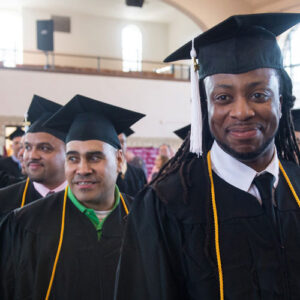
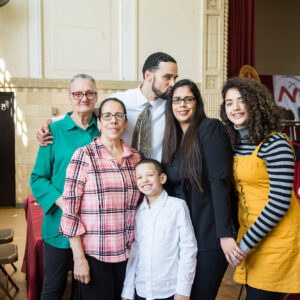
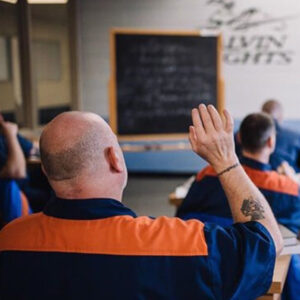
Immigration
Our institutions work in a wide variety of ways to follow the biblical commands to care for those who live on the margins and in the forgotten areas of society—including those who want to pursue higher education but are in the United States illegally through no fault or decision of their own. Along with our friends on the Evangelical Immigration Table, we support bipartisan, comprehensive immigration reform that:
- Respects the God-given dignity of every person;
- Protects the unity of the immediate family;
- Respects the rule of law;
- Guarantees secure national borders;
- Ensures fairness to taxpayers; and
- Establishes a path toward legal status and/or citizenship for those who qualify and who wish to become permanent residents.
Dreamers are young people brought to the U.S. illegally and are undocumented through no fault of their own. Dreamers and DACA recipients are valuable contributors on CCCU campuses, and we support a permanent solution to secure certainty for them and their communities. Almost 700,000 recipients of the Deferred Action for Childhood Arrivals (DACA) program are protected to work and study in the U.S., contributing billions to the economy. A bipartisan, permanent policy will provide certainty for these individuals and allow our CCCU students who are undocumented to continue their education, ultimately using their talents to serve the kingdom of God without fear of deportation.
Along with our partners at the Evangelical Immigration Table (EIT), we are working toward permanent bipartisan immigration reform. Our approach is driven by biblical principles and our belief that each person is made in the image of God, deserving of dignity. There is also a need for safety, security, and the rule of law. The EIT’s Evangelical Call for Restitution-Based Immigration Reform invites Christians to advocate for solutions that strengthen the law, have a process of restitution, and create a pathway for immigrants, including Dreamers. See more information about the restitution-based approach here, as well as a sign-on letter to call Congress to resolve the problems in our immigration system.
CCCU institutions are made better because of the contributions of their international students, who bring creativity, diverse perspectives, and brilliance to each campus. These individuals come to the United States to receive a high quality, Christ-centered education and are invaluable members of our communities and economy. The CCCU supports policies and regulations that allow for students to continue to come to the U.S. for higher education, as well as the continuation of post-graduate programs such as the Optional Practical Training (OPT) program. This allows for temporary employment of F-1 visa students and for them to work, train, and develop in their field of interest.
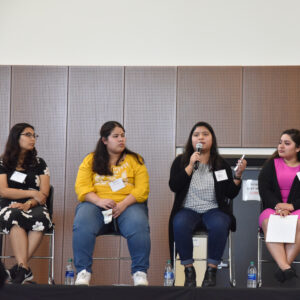
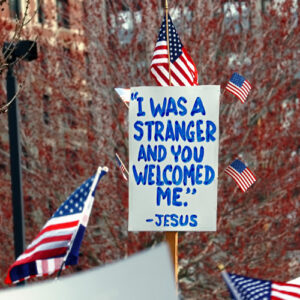
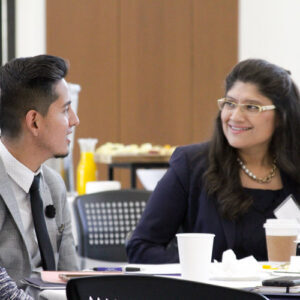
Advocacy Resources
CCCU Advance Magazine: Why Advocacy Work is Essential
Senator James Lankford: Faith in the Public Square
Toolkit: Religious Freedom Resources
